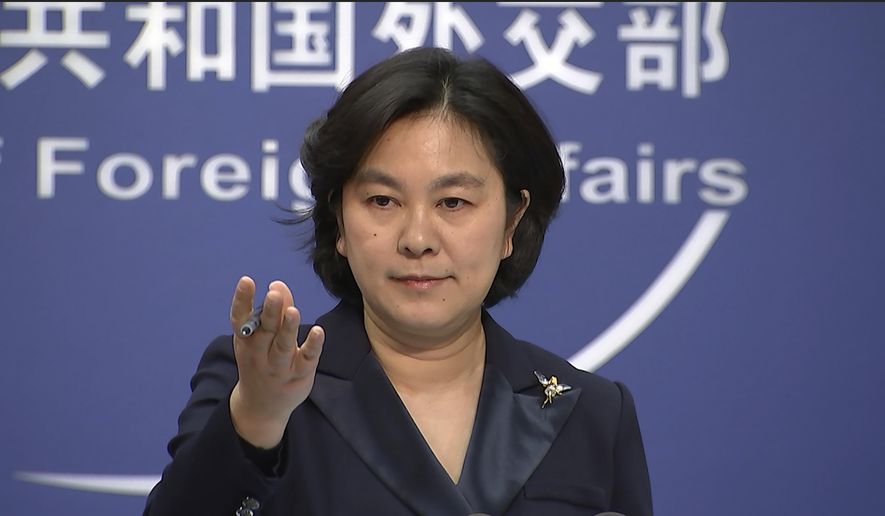China’s communist leadership took one final parting shot at the outgoing Trump administration, slapping sanctions Wednesday on 28 former U.S. officials, banning them from entering or doing business in the country moments after they left office based on “a series of crazy U.S. moves on China-related issues.”
The sanctions marked a sign of frustration in Beijing after a string of punishing moves by Mr. Trump’s national security against China in the final weeks of his term, capped by the declaration this week that China’s harsh treatment of ethnic minority Uighurs in Xinjiang province amounted to genocide.
Recent U.S. sanctions have also targeted individuals within the Chinese government responsible for what the U.S. says are repressive policies in Xinjiang and Hong Kong, including at least one member of China’s ruling Politburo. Mr. Trump and his aides have also been sharply critical of Beijing’s aggression in the South China Sea and its handling of the early stages of the coronavirus pandemic, which first emerged in China and spread across the globe last year.
The sanctioned Trump administration officials include former Secretary of State Mike Pompeo, White House economic adviser Peter Navarro, National Security Adviser Robert C. O’Brien, Deputy National Security Adviser Matthew Pottinger, Health and Human Services Secretary Alex M. Azar II, and U.N. Ambassador Kelly Kraft, as well as former administration officials John R. Bolton and Stephen Bannon, a Chinese Foreign Ministry spokesperson told Xinhua News, a state-controlled wire service.
“These individuals and their immediate family members are prohibited from entering the mainland [of China], Hong Kong and Macao. They and companies and institutions associated with them are also restricted from doing business with China,” the spokesperson said.
Xinhua News made no secret of its feelings about Mr. Trump, tweeting prior to the inauguration, “Good riddance, Donald Trump!”
“Over the past few years, some anti-China politicians in the United States, out of their selfish political interests and prejudice and hatred against China and showing no regard for the interests of the Chinese and American people, have planned, promoted and executed the crazy moves which have gravely interfered in China’s internal affairs, undermined China’s interests, offended the Chinese people, and seriously disrupted China-U.S. relations,” said the ministry.
The sanctions were revealed shortly after President Biden was sworn in. Mr. Biden’s top aides say he broadly supports Mr. Trump’s hard line with Beijing, but will try to work with China’s communist leaders when possible.
At a press briefing, Foreign Ministry spokesperson Hua Chunying took particular aim at Mr. Pompeo, who was with Mr. Navarro perhaps the most outspoken China hawks in the Trump administration.
“In our view, Pompeo’s so-called [genocide] designation is a piece of wastepaper,” said Ms. Hua. “This American politician, who is notorious for lying and deceiving, is turning himself into a doomsday clown and joke of the century with his last madness and lies of the century.”
Citizens for the Republic, a conservative group founded by Ronald Reagan, said that Mr. Pompeo and the other Trump officials “should wear Chinese sanctions as a badge of honor.”
“True to form, the corrupt Communists in Beijing are canceling anyone who speaks truth to their lies,” said the group’s statement. “They’re just upset that after years of other countries letting them off lightly, the United States finally decided to take a hard stance against the unambiguous evil they carry out on a daily basis.”
It may seem ill-timed to issue the sanctions just as the Trump administration was heading out the door, but the Global Times, a state media outlet that closely reflects the thinking of the ruling Communist Party, cited one Chinese expert who said the sanctions would serve as a warning to Mr. Biden and future presidents.
“When these people were in office, they jumped like mad dogs and used their power to make a mess of the China-U.S. relationship,” Shen Yi, an international relations specialist at Shanghai’s Fudan University, told the Global Times. “China would never allow people to make money on the Chinese market while attacking the country.”
Should Mr. Pompeo or the other sanctioned U.S. officials hope to sell a future book or memoir in the Chinese market, Mr. Shen said, that would be “impossible.”
• Valerie Richardson can be reached at vrichardson@washingtontimes.com.




Please read our comment policy before commenting.